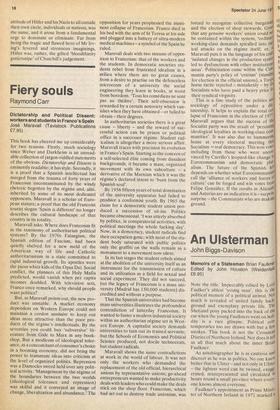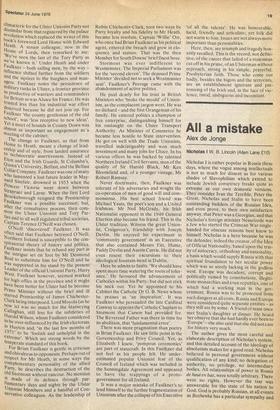An Ulsterman
John Biggs-Davison
Memoirs of a Statesman Brian Faulkner Edited by John Houston (Weidenfeld E6.95)
Note the title. Impeccably edited by Lord Faulker's ablest 'young man', this is the political memoir of a political animal. Not much is revealed of united family back' ground and exemplary private life. Tilt Shetiand pony packed into the back of tllC car when the young Faulkners went on holt' day is a rare glimpse. Political con' temporaries too are drawn with but a fel strokes. This book is not the Crossmarl Diaries of Northern Ireland. Nor does it tell us all that much about the inner Briall Faulkner. As autobiographer he is as cautious and discreet as he was in politics. No one knew better that in Ulster — and not only in Ulster — the lightest word can be twisted, exaggerated, misrepresented and circulated 01 hours round a small province where everY' one knows almost everyone. Faulkner's appointment as Prime Minister of Northern Ireland in 1971 marked 3 climacteric for the Ulster Unionist Party not dissimilar from that registered by the palace revolution which replaced the writer of this book's foreword Lord Home with Edward Heath. A senior colleague, now in the House of Lords, then remarked to me: We've seen the last of the Tory Party as We've known it.' Under Heath and under Faulkner — both sailing men, by the way — influence shifted further from the soldiers. and the squires to the burghers and managers. Faulkner notes the persistence of military ranks in Ulster, a frontier province as productive of warriors and commanders for Britain as was Alsace for France. He was trusted less than his industrial war effort deserved because he did not join up. For Faulkner 'the county gentleman of the old s.,?.hool', was `less receptive to new ideas'. et a meet of hounds in County Down was almost as important an engagement as a meeting of the cabinet. The change to Faulkner, as that from Home to Heath, meant a change of leadership and of style, from landed assurance to technocratic assertiveness. Instead of Eton and the Irish Guards, St Columba's, Queen's University, Belfast, and the Belfast Collar Company. Faulkner was one of many Who lamented a lost future leader in Maynard Sinclair, drowned in 1953 when the Princess Victoria went down between Stranraer and Lame. When the first Lord Brookeborough resigned the Premiership Faulkner was a possible successor; but, after the consultative process, then common the Ulster Unionist and Tory Parties and to all well regulated tribal societies, Captain Terence O'Neill was chosen.
O'Neill `discovered' Faulkner. It was often said that Faulkner betrayed O'Neill. Northern Ireland is susceptible to the conspiratorial theory of history and politics. Faulkner insists that he refused any part in the intrigue set on foot by Mr Desmond Boal to substitute him for O'Neill and he was supported in his stand by the present Leader of the official Unionist Party, Harry West. Faulkner however, seemed marked for high office in the province and it might have been better for Ulster had he become Prime Minister without the brief and ill starred Premiership of James ChichesterClark being interposed. Lord Moyola (as he now is) was no match for the blarneying Callaghan, still less for the subtleties of Harold Wilson, whom Faulkner considered to be over-influenced by the Irish electorate in Huyton and, 'in the last few months of 1971' to be 'foolish and unhelpful in the extreme'. Which are strong words by the temperate standard of this book.
For Brian Faulkner is gentle in criticism and chivalrous to opponents. Perhaps out of respect for Mr Heath, in some ways the complementary personality of the allied Party, he describes the destruction of the old Stormont without rancour. No mention is made of its defence through parliamentary days and nights by the Ulster Unionist Members and a handful of Conservative colleagues, As the leadership of
Robin Chichester-Clark, torn two ways by Party loyalty and his fidelity to Mr Heath, became less resolute, Captain `Willie' Orr, who once had Brian Faulkner as his political agent, entered the breach and grew in eloquence and stature. That was the then Member for South Downs' brief finest hour.
Stormont was ever indifferent to Westminster. The Imperial Parliament was for the 'second eleven'. The deposed Prime Minister `decided not to seek a Westminster seat'. Faulkner's Peerage came with the abandonment of active politics.
He paid dearly for his trust in British Ministers who 'broke the mould' of Unionism, as the complacent jargon went. He was no diehard — and the first Orangeman of his family. He entered politics a champion of free enterprise, distinguishing himself for his onslaught on the Ulster Transport Authority. As Minister of Commerce he became less hostile to State intervention. He got on well with the Trade Unionists, travelled indefatiguably and won much investment and many jobs for Ulster. In his various offices he was backed by talented Northern Ireland Civil Servants, men of the quality of Sir Harold Black, Mr Ken Bloomfield and, of a younger vintage, Mr Robert Ramsay.
Never doctrinaire, then, Faulkner was tolerant of his adversaries and sought the co-operation of men of good will and commonsense. His best school ' friend was Michael Yeats, the poet's son and a United Irishman. Mr Ned McGrady, his Irish Nationalist opponent in the 1949 General Election also became his friend. This in the Ulster tradition. Witness the great Union ist, Craigavon's, friendship with Joseph Devlin. He enjoyed his experiment in `community government' in an Executive that also contained Messrs Fitt, Hume, Paddy Devlin and Austin Currie. He did not even resent their excursions to their ideological fountain-head in Dublin.
Here he admits to faults. `We should have spent more time watering the roots of tolerance.' He favoured the advancement of Catholics within his Party; but did not stick his neck out. Yet he appointed to his Cabinet the Catholic Dr G. B. Newe whom he praises as `an inspiration'. It was Faulkner who persuaded the late Cardinal Conway to appoint the Catholic Chaplain to Stormont that Carson had provided for. The Reverend Father was there in time for its abolition, that `fundamental error'.
There was more pragmatism than poetry in Brian Faulkner. He saw little point in the Governorship and Privy Council. Yet, as Elizabeth I knew, 'pompous ceremonies' are part of statecraft. In this Faulkner did not feel as his people felt. He underestimated popular Unionist fear of the Council of Ireland which was included in the Sunningdale Agreement and appeared to have the trappings of a protogovernment for all Ireland.
It was a major mistake of Faulkner's to lend himself to the further fragmentation of Unionism after the collapse of his Executive 'of all the talents'. He was honourable, lucid, friendly and articulate; yet folk did not warm to him. Issues are not always more important than personalities.
Here, then, are triumph and tragedy honestly recalled. This is the record, not definitive, of the career that failed of a statesman cut off in his prime, of an Ulsterman without reproach, strong in his simple, prayerful, Presbyterian faith. Those who come out badly, besides the bigots and the terrorists, are an establishment ignorant and patronising of the Irish and, in the face of violence, timid, ambiguous and inconstant.















































 Previous page
Previous page